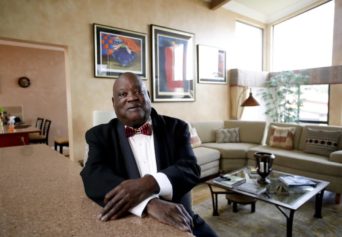
As the top law enforcement official in a land where the criminal justice apparatus is decidedly stacked against people of color, the nation’s first Black attorney general has made it his mission to bring some equity to the system. His latest salvo came last week during a Philadelphia speech to criminal defense lawyers.
He was speaking about the practice of judges looking at a person’s background, employment history, neighborhood and home life in determining the severity of a sentence.
“Basing a sentence on something other than the conduct of the person involved and the person’s record, you’re looking, for instance, at factors like the person’s education level, what neighborhood the person comes from,” Holder explained to PBS. “They’re using this as a predictor of how likely this person as an individual is going to be a recidivist. I’m not at all certain that I’m comfortable with that … I think the result is fundamental unfairness.”
Nazgol Ghandnoosh, a research analyst for the Sentencing Project, an organization dedicated to sentencing reform in U.S. prisons, told Al Jazeera America that research has shown Black and brown defendants who don’t have regular jobs or steady families are likely to be charged with more severe crimes, leading to longer prison sentences.
“A lot of the criteria to measure risk has to do with disparities in race and class to the extent that we’re looking at data factors like employment or level of education or marital status and family resources … things someone is not able to change,” Ghandnoosh said. “We are creating a two-tiered system of sentencing.”
Ghandnoosh said because police forces typically have a heavier presence in low-income and minority areas, that makes individuals in those communities more likely to be arrested in the first place.
“I think Holder’s statement is helpful because it brings attention to the fact that just focusing on addressing the really high levels of incarceration we have in this country is not sufficient to address its racial disparities,” she said.
Holder has tried to make big changes to the system, last year instructing federal prosecutors to end mandatory minimum sentences for many nonviolent drug defendants and in April starting a push to grant clemency for nonviolent drug offenders — which according to The Associated Press has resulted in more than 3,300 federal inmates applying to have their sentences cut short, nearly five times the number who applied for commutations in the same period the year before.
Federal statistics show that nonviolent drug offenders represent nearly half the estimated 216,000 inmates in federal prisons, according to Al Jazeera America.
Earlier this year, Holder testified before the U.S. Sentencing Commission to endorse a plan to reduce the average prison sentence for dealing drugs, from 62 months to 51 months.
“Certain types of cases result in too many Americans going to prison for far too long, and at times for no truly good public safety reason,” Holder said, according to The Washington Post.
The proposed changes would affect about 70 percent of drug offenders and decrease the federal prison population by about 6,550 inmates over the next five years.
But the administration’s clemency push ran into unexpected trouble last week when the agency that oversees the federal courts said federal public defenders and other court-appointed attorneys could not represent inmates in the clemency process. The top lawyer for the Administrative Office of the Courts wrote a memo stating that the U.S. Constitution does not guarantee inmates the right to legal representation during the clemency process, which involves the executive and not judicial branch.
“There is no Sixth Amendment right to counsel for purposes of seeking executive clemency and no statutory right, except in capital cases … there is no authority under the CJA [Criminal Justice Act] or other law to appoint counsel in non-capital clemency proceedings,” General Counsel Robert Loesche wrote.
This means the federal government could not pay federal defenders, whose salaries are paid by the government, and court-appointed private attorneys, who receive federal reimbursement when they are called in for service, to manage the clemency process for defendants. According to Al Jazeera, the decision “would sideline many lawyers who have come to know their clients’ cases intimately over years of work, requiring them to turn over the task of filing clemency petitions — which draw on a prisoner’s personal and legal history — to new attorneys.”


